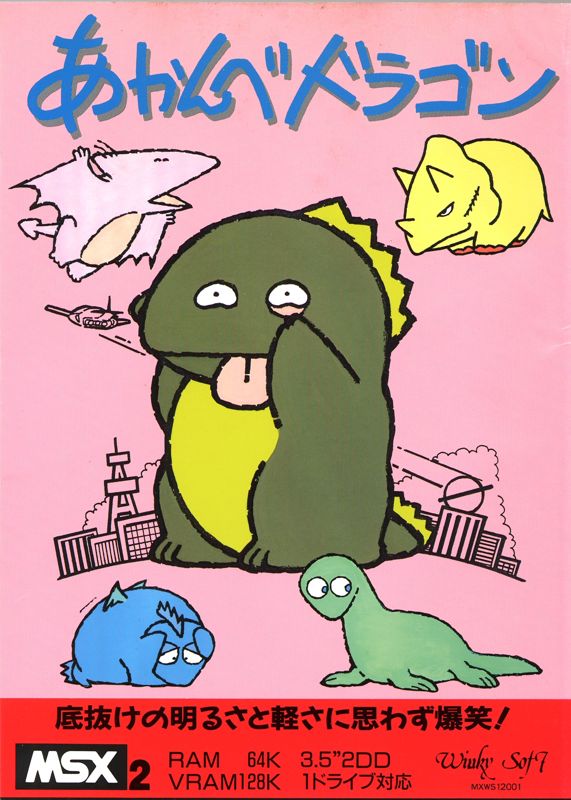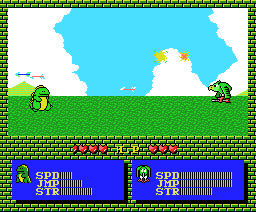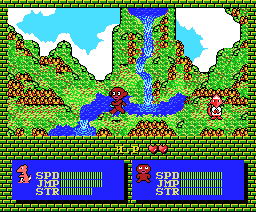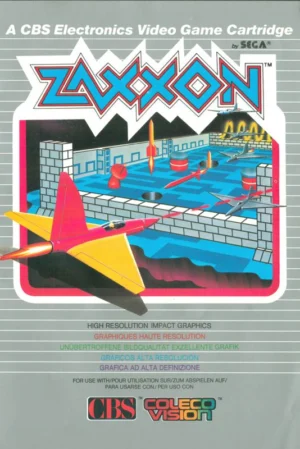Retro Replay Review
Gameplay
Akanbe Dragon blends strategic board‐game tactics with real‐time action sequences in a way that feels both familiar and fresh. On a single‐screen grid, you command a squad of dinosaurs against a computer‐controlled host of beasts, each with unique movement patterns reminiscent of chess pieces. Some units traverse diagonally, others advance in straight lines, and certain heavy hitters lumber slowly but pack a punch. This chess‐style setup requires you to think several moves ahead, positioning your creatures to exploit weaknesses and lure enemies into unfavorable encounters.
When two creatures land on the same square, the game switches from top‐down strategy to a side‐view action duel. You hop into the role of your dragon, dodging enemy fire while returning shots with variable speed and power. Every creature’s stats—speed, jump height, strength, and shot potency—feel distinct, so no two encounters play out quite the same. Timing your jumps and shots is critical; a poorly timed leap can leave you open to a flurry of attacks, while a perfectly executed counterstrike can turn the tide instantly.
For those who crave variety, Akanbe Dragon’s built‐in level editor is a major boon. You can craft custom scenarios, laying out starting positions, environmental hazards, and opposing unit compositions to create new strategic puzzles. Whether you’re designing an all‐out melee or a slow, tactical dance, the editor gives the game a remarkable degree of replayability. And if you ever hit a particularly brutal scenario, the continue option lets you pick up where you left off without wiping out your entire campaign progress.
Graphics
Given its era, Akanbe Dragon’s graphics are pleasantly colorful and surprisingly detailed. The one‐screen battlefield is crisply delineated, with clear grid lines and distinct square textures that shift subtly depending on the environment. Each creature sprite—whether a nimble Velociraptor or a hulking Triceratops—boasts a variety of frames for movement, attack, and idle stances, giving the battlefield a lively feel even when little is happening.
During action sequences, the side‐view perspective showcases more elaborate animations. Your dragon’s fireballs flare with bright, pixelated bursts, and enemy projectiles zip across the screen with satisfying velocity. Backgrounds change to reflect different milieu effects, from rocky caverns that limit your jump height to grassy plains where you gain a slight speed boost. These visual shifts are more than cosmetic; they draw you deeper into the tactical possibilities of each encounter.
Though not pushing the hardware to its limits, Akanbe Dragon’s art direction remains charming. The developers’ roots in what would become the Super Robot Taisen franchise are evident in the solid sprite work and clear visual feedback during battles. Each unit’s size and color palette help you distinguish roles at a glance, making it easier to formulate and adapt strategies on the fly.
Story
While Akanbe Dragon doesn’t deliver a sprawling narrative, it sets a straightforward premise that hooks you in quickly. Dinosaurs and beasts clash over control of a mysterious, resource‐rich island, and you play the commander of the dragon faction seeking to restore balance. There’s no lengthy exposition—just a series of escalating scenarios that simulate the ebb and flow of territorial warfare.
In lieu of cutscenes or dialogue, the level progression itself tells a minimalist story. Early stages serve as training grounds—simple skirmishes designed to teach movement rules and combat basics. As you advance, the beasts deploy more specialized units, forcing you to experiment with different dinosaur combinations and tactics. The narrative emerges organically through gameplay challenges rather than text dumps or cinematic sequences.
Fans of strategic storytelling will appreciate how each map has its own “flavor,” from volcanic battlegrounds hinting at an awakening ancient power to mist‐shrouded forests where agility reigns supreme. Although Akanbe Dragon is clearly more strategy‐focused than plot‐driven, its environmental variety and escalating difficulty curves keep the implied storyline of conquest and survival engaging throughout.
Overall Experience
Akanbe Dragon strikes a rare balance between cerebral strategy and hands‐on action. You’re never confined to purely abstract planning; each successful capture or defeat unfolds in a burst of real‐time excitement. This dual‐layered design makes the game accessible to players who might shy away from traditional chess‐like titles, while also satisfying those craving deeper tactical puzzles.
The longevity factor is high thanks to the scenario editor and continue system. Even after you’ve conquered the developer’s maps, you can create custom layouts to challenge friends or test your own ingenuity. If you find yourself stuck on a particularly fiendish design, the continue feature prevents frustration by letting you learn from mistakes without severe penalties.
Ultimately, Akanbe Dragon provides a unique time‐capsule experience that hints at the evolution of the Super Robot Taisen series. Its blend of grid‐based strategy and side‐scrolling action remains engaging decades after its release. For players interested in innovative hybrids of board games and interactive combat, or those simply curious about a forgotten classic from a revered developer, Akanbe Dragon is well worth exploring.
 Retro Replay Retro Replay gaming reviews, news, emulation, geek stuff and more!
Retro Replay Retro Replay gaming reviews, news, emulation, geek stuff and more!









Reviews
There are no reviews yet.